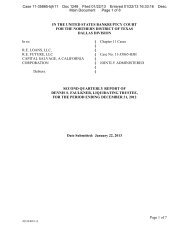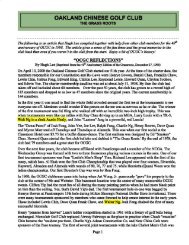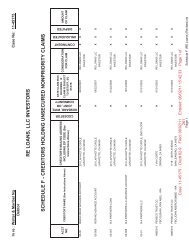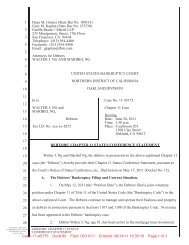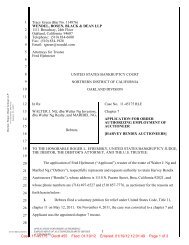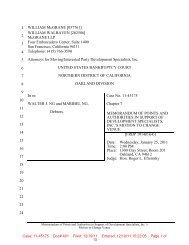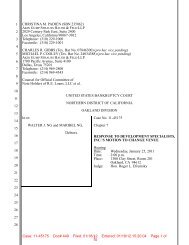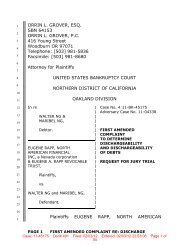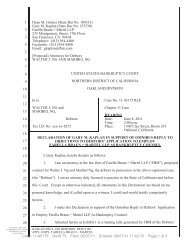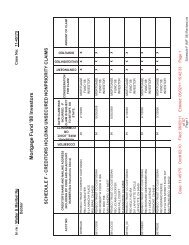Class Plaintiff's Response to Automatic Stay - equitatus
Class Plaintiff's Response to Automatic Stay - equitatus
Class Plaintiff's Response to Automatic Stay - equitatus
Create successful ePaper yourself
Turn your PDF publications into a flip-book with our unique Google optimized e-Paper software.
Case 11-03620-bjh Doc 40 Filed 02/21/12 Entered 02/21/12 23:34:41 Desc Main<br />
Document Page 19 of 34<br />
and rights of the members by stripping them of any recourse <strong>to</strong> RE Loans’ assets. CC 92. The<br />
exchange agreement “turned the Members in<strong>to</strong> holders of promissory notes with security interests<br />
second <strong>to</strong> that held by Wells Fargo.” CC 94. Through the exchange agreement, “the Members lost<br />
all rights they had as equity shareholders in RE Loans and were relegated <strong>to</strong> second-tier credi<strong>to</strong>rs<br />
with junior security interests.” Id. Through nondisclosure of important information and unfair<br />
transactions, the managers and Greenberg deprived the members of the right <strong>to</strong> protect their<br />
investments.<br />
2. Each of the Claims are Direct and Therefore Belong <strong>to</strong> <strong>Class</strong> Plaintiffs<br />
a) <strong>Class</strong> Plaintiffs’ Aiding and Abetting Claims (Breach of Fiduciary<br />
Duty (First Cause) and Fraud Claim (Fifth Cause)) Are Direct<br />
Claims<br />
44. As explained above, the aiding and abetting breach of fiduciary duties and fraud claims<br />
cannot belong <strong>to</strong> the estate because none of the duties allegedly breached were owed <strong>to</strong> RE Loans.<br />
The hiding of past securities violations and the secret line of credit loan breached the duty of truthful<br />
disclosure owed by the Managers <strong>to</strong> the members. The exchange transaction, through which RE<br />
Loans members were induced <strong>to</strong> surrender their equity interests and approve the unauthorized Wells<br />
Fargo loan, breached the RE Loans Managers' duty of loyalty and duty <strong>to</strong> refrain from engaging in<br />
unfair transactions, as <strong>to</strong> those members. <strong>Class</strong> Plaintiffs allege that, had the RE Loans Managers<br />
disclosed the securities violations and cash shortage in June 2007, the RE Loans members "would<br />
have at least had the option <strong>to</strong> take steps <strong>to</strong> save at least some of their initial investments. CC 114.<br />
These types of duties – truthful disclosure and <strong>to</strong> refrain from engaging in unfair transactions – are<br />
owed by the Managers <strong>to</strong> the members, but not the company.<br />
45. California <strong>Class</strong> Plaintiffs own the aiding and abetting fraud claim for the same reasons they<br />
own the aiding and abetting breach of fiduciary duties claim. The fraud-based allegations are that, by<br />
drafting the misleading exchange agreement documents, Greenberg substantially assisted the RE<br />
Loans Managers in directly injuring the members by fraudulently inducing them <strong>to</strong> consent <strong>to</strong> the<br />
exchange agreement.<br />
13



